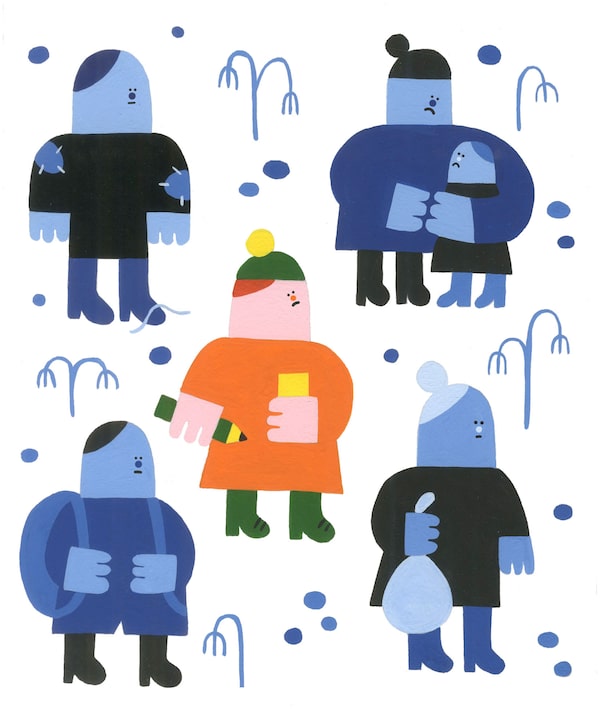
Illustration by Camilla Teodoro
First Person is a daily personal piece submitted by readers. Have a story to tell? See our guidelines at tgam.ca/essayguide.
I leave the recorder rolling with a lump in my throat. My job is to collect stories from people who come to the Scott Mission in downtown Toronto. We are tucked away in a dingy corner cubicle. She is crying, and her groceries are at our feet in a clear plastic garbage bag. I have known this woman for less than five minutes.
I notice the gap in her teeth. I take in her dull blonde hair knotted high in a messy bun. Tears slip down her face painting thin, shimmering rivers down her cheeks. They curl under her chin as she continues to spill the jagged details of her story. As I listen, I feel the familiar knot of privilege squeeze in my gut. The desk between us may as well be a chasm.
The assistance clients of the Mission receive, such as clothes and food, is similar, but the stories always chip into new places of my heart with the often unfair circumstances that draw them here. It is my job to bear witness to these stories for the public relations department, recording them diligently on my phone. I have listened to dozens of them. Many pour out in broken English.
Often the moments untether and tears spill out. Every story sews the gap between us closer shut and, at the same time, starkly highlights it. Refugee. Single mother. Lost job. Addiction. The core of it all is that these are human beings just like me. It isn’t much of a stretch to imagine myself on the other side of the desk. It could happen so fast.
When the interview is over, she picks up her groceries and leaves to brave the freezing temperatures outside. Her breath escapes her body in white puffs. I sit back in my desk chair. I think about a moment, earlier in the day, when a woman asked me quietly if I could give her a black garbage bag so no one would see that she was carrying groceries through the clear garbage bag. I see dignity and shame clash too often these days.
“Why me?” I often wonder as I draft notes after an interview. I’m honoured to be the one to listen, but I feel the tension of privilege warring within me. I won luck of the draw and got to listen instead of tell. I’m not the one carrying my groceries out of here. Later, I’ll drink Starbucks and curl up with my laptop to write. I have a cushy life and, somehow, I get paid to hear others tell me about their lives on the margins.
As I leave the Mission later that day, stepping out into the freezing air with my brand-name backpack hitched over my down-filled parka, I think about the responsibility of knowing. I mull over this because my privilege looks me in the eye on a daily basis. My boyfriend’s family immigrated to Canada from Afghanistan when he was too young to remember. His skin and hair, olive and dark, warmly contrast my pasty white skin and dirty blonde hair. If physical characteristics don’t give it away, I only have to say his name, Abdullah, and our story is exposed.
The divide between us pops up in strange ways. At a pizza joint one day, the cashier asks for Abdullah’s name.
“Alexander,” he says.
The white receipt flutters onto the tray with the this new name printed on it. Letters strung together, completely untrue, betray a fundamental difference in our life experiences.
“Why did you lie?” I ask softly. “About your name?”
“It’s just … easier,” he says.
What’s in a name? The misalignment between that name and the man I know twists knots in my gut. I, once again, find myself caught in a middle space between ignorance and experience. Understanding the way he approaches the world punches open a new dimension in my own life, painful and confusing. How do I navigate a world where I don’t have to worry or feel the need to shave before I go to the airport because of my name, yet my boyfriend does?
How do I live in a world where I see inequality on a regular basis through the clear plastic of a garbage bag? One of my interview subjects cried in my cubicle because her daughter did not have a coat for the winter. I thought about that when I zipped my parka up and walked away from the Mission and back into my own life.
Story, I think, must imply responsibility. The writer, Chimamanda Ngozi Adichie, warns about the dangers of a single story. She speaks about the damage that reverberates from clinging to stereotypes and assumptions versus listening to the truth of the human being before you. I wonder, when we look at our own stories, if it isn’t a warning sign if their characters and settings look monochromatic.
I don’t want my story to be singular. The more diverse stories I’ve welcomed in, the more interesting and truthful my life has become. As I continue down the sidewalk, balanced in the world between the margins and the privileged, one question hangs in the air: My story is important, but what if it is not the most important one?
Christina Janssens lives in Burlington, Ont.